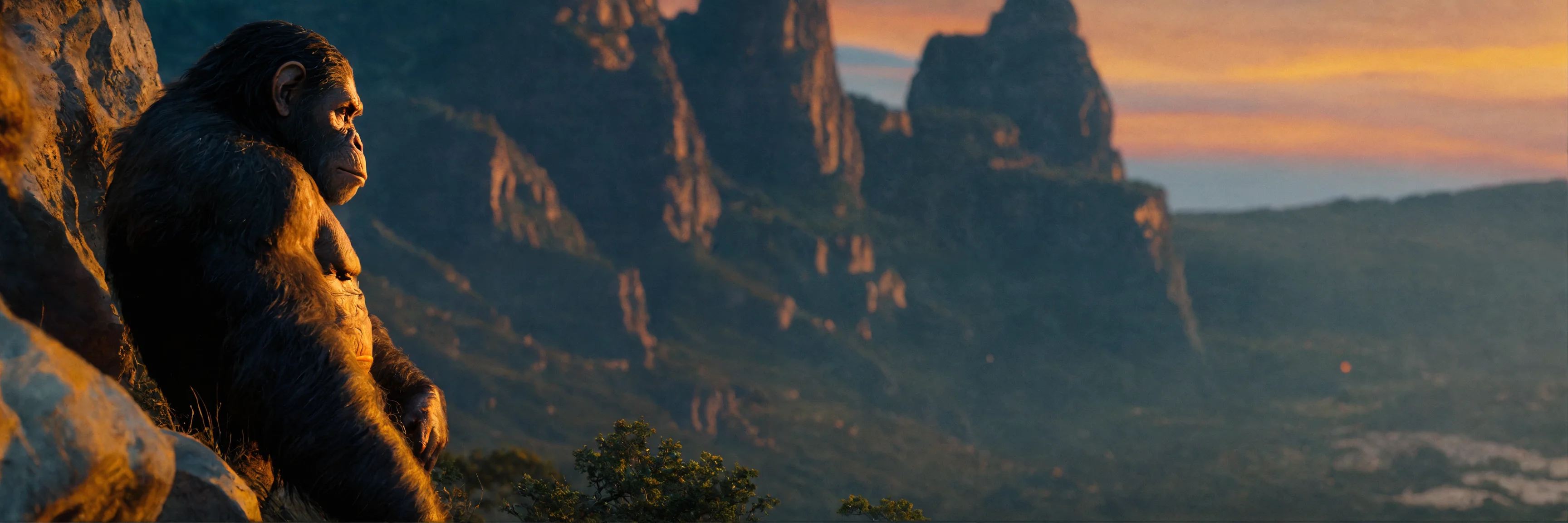For quite a long time, one inconsistency with my understanding of the world troubled me, which I noticed in the very first film Planet of the Apes. One of the astronauts, captured by the apes during the hunt, George Taylor, retained consciousness, while the other astronaut very quickly lost his human face and began to behave like the other people of that society – like an animal.
For a long time, I thought this was implausible: that the tendency should have been the same, since both astronauts came from roughly the same background, were of similar culture and education. The tendencies of their behavior and adaptation in those conditions should have been at least similar if not identical. Since both were astronauts, both should have been trained for various situations, emotionally stable, and analytical. Meanwhile, one astronaut retained consciousness, while the other lost it almost instantly.
Such a difference in the consequences of the environment’s influence on two people, who were supposed to have similar reactions, always puzzled me a bit. For me, it wasn’t plausible; it seemed like an unjustified “trick” to attract attention.
And suddenly today I thought about a possible reason for such a difference in reaction. And this idea unexpectedly fit very harmoniously into my existing coordinate system.
I suddenly realized that despite the fact that these two astronauts had very similar initial characteristics with which they found themselves in the conditions of the “Planet of the Apes”, the conditions in which they found themselves on this planet were completely different. If you remember, George was noticed by the scientist-ape Zira, and thanks to her, he managed to start proving that he had consciousness and he was not an animal.
The same Zira was not present in the life of George’s friend, the second astronaut. The very important difference in the existence on the Planet of the Apes of two conscious humans was the presence in George’s life of a creature that believed in him. It believed and never stopped believing for a minute.
Suddenly this idea, which seems completely secondary against the background of everything that happens in the novel, became clear and almost the main one. Especially in the context of what I personally believe. Without attention, support, and belief from loved ones, surroundings, community, a person breaks down, his personality collapses. No one can exist outside the context of community, support, and belief. And in the case of the second astronaut, it is very clear how quickly and fundamentally a person’s personality changes when they stop being perceived.
For those apes, the second astronaut was an animal – and very soon he became one. This is the second thought that follows from this example: the opinion and perception of a person by his environment, his community, has an incredibly strong influence on a person. Very few – extremely strong internally and emotionally imperturbable people – are capable of not perceiving the influence of the environment’s opinion on them. And I am convinced that if they manage to do this, it only means that they have a closer environment that rewrites, suppresses the opinion and perception of them by others, in other words – belief, support, and attention.
It’s amazing how much of a social creature humans are, how important it is for us to be perceived, and perceived positively (as far as we understand the concept of “positive”).
I think many will agree with me that they have experienced different feelings (self-perceptions) in the society of different people. In the company of some, we are smart, we have good manners, we speak well and fluently, while in the company of others we suddenly become tongue-tied, awkward, and may even start to exhibit qualities that we have never seen in ourselves. I personally am convinced that how we manifest ourselves in the society of different people (different environments) depends to a large extent on how this environment perceives us, what it thinks of us.
That’s why I believe (these are already my secondary quirks) that a friend will never think badly of me, if only because it affects how I feel. A friend will find the best in me and focus on it. I’m not talking about when a person does bad things. If I behave badly, unfairly, unkindly, I will be glad if my friend points it out to me, on the contrary, I will be glad to hear this about myself from a friend, because I trust him and know that he wishes me well. But when my friend starts talking behind my back or telling lies about me when in his company I feel ugly, stupid, because that’s what he thinks of me – I believe that this is not a friend, that this is not love (friendship for me is love, just without intimacy).
Likewise, I don’t consider a person a friend if they regularly express the idea that they are better than me – smarter, more educated, stronger, more popular. Well, that is, if a person who supposedly considers himself my friend does this, then it’s just disgusting, some kind of narcissist with a grandiose delusion, who surely cannot be a friend or love, who only needs admiration. Fortunately, I have already begun to understand this and remove such “friends” from my circle.
I had one (as I thought) “friend”. Smart, talented. She was always nice to me in words. She had one wonderful project (I won’t go into details, otherwise, she will be very easy to identify), and I was glad to help her with it, completely for free, just because I wanted to help her. I helped, helped, until she regularly began to show that she did not value neither my help nor my expertise (for example, she hired a less qualified person to make her website and paid him $10,000, he, of course, did a complete crap job and then charged her $80 per hour for every little thing).
I was completely amazed when I offered to help her with marketing materials for the exhibition, she was happy, agreed (although she already had some paid girl to help her prepare for this event), and when I started offering ideas according to the agreement, my “friend” sent this girl to fire me, she didn’t talk to me directly in a friendly manner, like, maybe we ourselves, but asked this girl to email me. Here I completely fell into shock, how much you need to disrespect me, my work, my desire to help you to treat me like this. I cut off all contacts, deleted her everywhere, and erased her from my life. Needless to say, the person never wrote to me and did not ask what happened. Zero reflection, megalomania. Such friends are not needed.
I am learning to listen to my feelings, not the words of people around me. You can say anything, but you can’t deceive feelings. You can’t deceive a look. Deeds don’t lie. A person can tell me a hundred times a day how much he loves me and how I am his beloved friend, but if he neglects to even say that he will be nearby (meeting with friends, even not at their home) and then says it as if in passing, I will never believe again that this person really wants to see me. If this friend doesn’t tell me to my face that he considers me an ugly person, but I see it in his sneaky glance at me when he thinks I don’t see or pay attention – I know that this person is not a friend to me. And I compare with other people who really see beauty and light in me and admire it, and it gives me strength, joy, and belief in myself.
No one has ever become happier if they are constantly told what a miserable piece of crap they are.





No responses yet